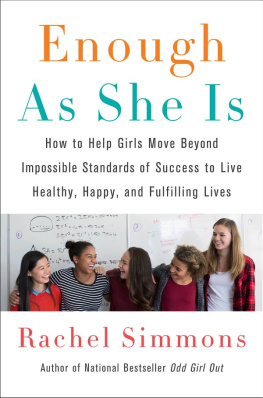Rachel Simmons - Enough As She Is
Here you can read online Rachel Simmons - Enough As She Is full text of the book (entire story) in english for free. Download pdf and epub, get meaning, cover and reviews about this ebook. year: 2018, publisher: HarperCollinsPublishers, genre: Romance novel. Description of the work, (preface) as well as reviews are available. Best literature library LitArk.com created for fans of good reading and offers a wide selection of genres:
Romance novel
Science fiction
Adventure
Detective
Science
History
Home and family
Prose
Art
Politics
Computer
Non-fiction
Religion
Business
Children
Humor
Choose a favorite category and find really read worthwhile books. Enjoy immersion in the world of imagination, feel the emotions of the characters or learn something new for yourself, make an fascinating discovery.
- Book:Enough As She Is
- Author:
- Publisher:HarperCollinsPublishers
- Genre:
- Year:2018
- Rating:5 / 5
- Favourites:Add to favourites
- Your mark:
- 100
- 1
- 2
- 3
- 4
- 5
Enough As She Is: summary, description and annotation
We offer to read an annotation, description, summary or preface (depends on what the author of the book "Enough As She Is" wrote himself). If you haven't found the necessary information about the book — write in the comments, we will try to find it.
Enough As She Is — read online for free the complete book (whole text) full work
Below is the text of the book, divided by pages. System saving the place of the last page read, allows you to conveniently read the book "Enough As She Is" online for free, without having to search again every time where you left off. Put a bookmark, and you can go to the page where you finished reading at any time.
Font size:
Interval:
Bookmark:
For Estee
To be a girl today is to enjoy historic promise. Our daughters come of age in a world unbound by the limits their mothers faced and unrecognizable to their grandmothers. Girls are glass ceilingbusting, selfie-taking world changers. For the last twenty years, my job has been to teach, study, live with, and listen to them.
But there is something troubling stewing beneath the surface of all this success. There are the girls so riven by anxiety about school that they cant sleep at nightlike the high school junior who obsessively refreshes her schools online grading system, first after school, then after sports practice, then after dinner, before bed, and then again when she wakes up, to calculate her GPA down to the minute.
There are the girls who cluster after finishing an exam, each competing to tell the other how badly they just failed, because it makes them feel better to anticipate failureand who collapse, inconsolable, when they score less than an A-. There is the girl who posts a selfie, then refreshes her screen repeatedly, only to delete her post for fear it hasnt gotten enough attention. There is the girl who cant hear a class lecture over the voice in her head wondering if she ate too much at lunch, and if her thighs look too fat against her chair.
For too many girls today, the drive to achieve is fueled by brutal self-criticism and anxiety that they will fail. We are raising a generation of girls who may look exceptional on paper but are often anxious and overwhelmed in lifewho feel that no matter how hard they try, they will never be smart enough, successful enough, pretty enough, thin enough, well liked enough, witty enough online, or sexy enough. No matter how many achievements they accrue, they feel that they are not enough as they are. This book is about how to help your daughter redefine success and pursue it on healthy terms, without sacrificing her self-worth, and to be well and whole in a world that often isnt.
Our culture is pummeling girls with toxic messages about success, and we are bearing witness to an epidemic of stress that is consuming young women from the inside. It has quietly become a mental health crisis for them, their schools, and their families, one that will only worsen if we dont sound the alarm.
The data is shocking. According to the Monitoring the Future survey cited by Jean Twenge in her book iGen, girls depressive symptoms increased by 50 percent from 2012 to 2015, more than twice as much as boys. In 2015, UCLAs annual Cooperative Institutional Research Program (CIRP) Freshman Survey, which includes responses from 150,000 full-time students at more than two hundred colleges and universities, logged the highest levels of unhappiness ever recorded in female first-year college students. The survey reported that twice as many females as males said they felt depressed frequently or occasionally; twice as many girls also said they were overwhelmed by all I have to do. The number of girls in these categories had shot up 25 percent over just fifteen years. At the same time, the number of girls who ranked themselves as most competitive among their peers rose by nearly 15 percent, while mens numbers remained nearly stagnant. Last year, the Girls Index, a national survey of twelve thousand fifth- through twelfth-grade girls, found that the number of girls who describe themselves as confident declines more than 25 percent throughout middle school. Confidence bottoms out in ninth grade, where it remains stagnant for the rest of high school. Success for these girls isnt a lifeline; those with a GPA higher than 4.0 were the least likely to say what they thought or disagree with others, because they wanted to be liked. Led by Dr. Lisa Hinkelman of the nonprofit Ruling Our Experiences, the survey displayed a nosedive in girls confidence alongside a simultaneous spike in a desire to change their appearance.
Its true that girls have never been more successful, but they have also never struggled more. Girl competence does not equal girl confidence. Nor does it equal happiness, resilience, or self-worth.
Each year, I teach thousands of young women around the United States. My college orientation programs help new students transition to college life and recover from their high school hangover. As a leadership development specialist at Smith College, I develop workshops for undergraduate women that cultivate resilience, self-compassion, and confidence. I spend most weeks during the academic year traveling to high schools and universities all over the country, where I work with students, parents, and teachers. And I serve as a scholar in residence at the Hewitt School in New York, where my job is to integrate research on girls into curriculum development, student workshops, and parent education.
I am tired of the headlines that trumpet the success of girls, as if good grades and college enrollment were the markers of a life well lived. Its time to dispense with the myth of the so-called amazing girl. We have allowed superficial criteria to influence our judgment of how girls are doing. When I listen to girls talk about how and why they achieve, and at what cost to their bodies, hearts, and minds, success is not the first word that comes to mind. We have long understood that low-income girls face multiple risks to their health, but new research finds that affluent adolescent girls are shockingly vulnerable. High school girls in affluent suburbs report using cigarettes and marijuana at nearly twice the normative rate. From depression and anxiety to body shame, they exhibit more adjustment problems, across more domains, than any other group of American youthyet continue to push themselves to achieve.
Why are girls struggling? Psychologists call it role overloadtoo many roles for a single individual to playand role conflictwhen the obligations of the roles you play are at odds with one another. Both conditions are known to induce high levels of stress. In the so-called age of Girl Power, we have failed to cut loose our most retrograde standards of female success and replace them with something more progressive. Instead, weve shoveled more and more expectation onto the already robust pile of qualities we expect girls to possess.
Women today have to succeed by traditionally male standards of education and career, but they also have to succeed by the traditionally female standards of beauty (not to mention motherhood), Duke Universitys Susan Roth has written. Girls have to be superhuman: ambitious, smart and driven, physically fit, pretty and sexy, socially active, athletic, and kind and liked by everyone. As Courtney Martin put it in Perfect Girls, Starving Daughters, Girls grew up hearing they could be anything, but heard they had to be everything.
An anything is possible mentality among American girls has thus wound up as a mental health crisis. A single-minded focus on giving girls access to every opportunity seems to have put into motion just the opposite: a double-digit gender gap in depression, anxiety, and confidence. In 2016, for the first time ever, a majority of students entering college described their mental health as below average. The number of teens who agree with the statement I cant do anything right has skyrocketed since 2011. Our 24-7 success-seeking culture has pushed girls to pursue achievement at the expense of all else, including the vital relationships that nourish them with self-esteem and resilience.
The embrace of achievement over attachment is threatening not just girls wellness but, ironically, also their ability to succeed. Relentless success-seeking keeps girls from taking healthy risks and becoming creative, original learners. It costs girls their courage, curbing their ability to figure out who they are and what really matters to them, exactly at the moment when this developmental task must be undertaken.
Font size:
Interval:
Bookmark:
Similar books «Enough As She Is»
Look at similar books to Enough As She Is. We have selected literature similar in name and meaning in the hope of providing readers with more options to find new, interesting, not yet read works.
Discussion, reviews of the book Enough As She Is and just readers' own opinions. Leave your comments, write what you think about the work, its meaning or the main characters. Specify what exactly you liked and what you didn't like, and why you think so.











